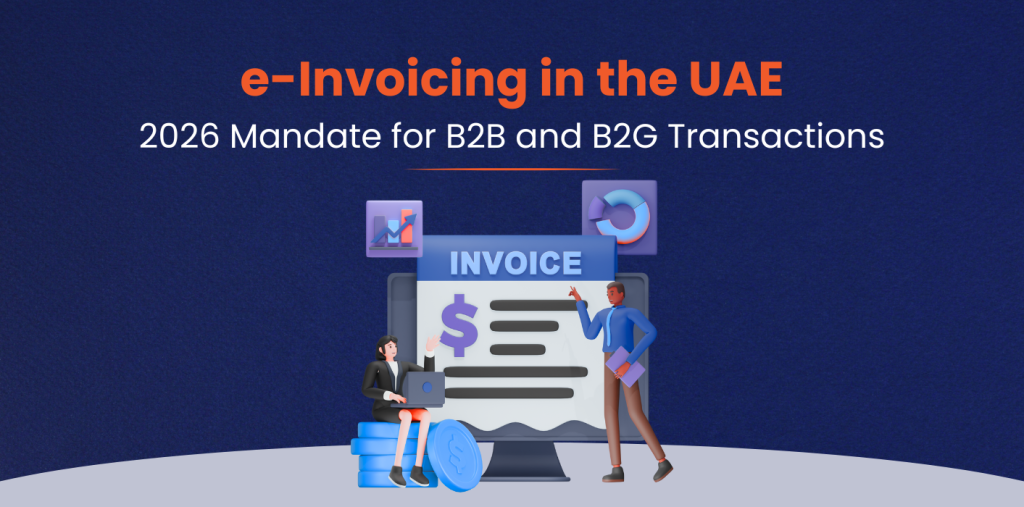The UAE Electronic Invoicing System is set to transform the way businesses operate and comply with tax regulations in the country. Scheduled to begin on July 1, 2026, with a phased rollout through 2027, the initiative will modernize invoicing processes, enhance transparency, and streamline tax compliance for companies of all sizes. This step represents a significant move towards digital transformation in the UAE’s business landscape.
Understanding the UAE Electronic Invoicing System
The UAE Electronic Invoicing System is a government initiative aimed at standardizing and automating invoice issuance and reporting. Businesses will now be required to issue electronic invoices for both business-to-business (B2B) and business-to-government (B2G) transactions. The system ensures that all invoices meet government standards and are securely shared with the Federal Tax Authority (FTA).
The electronic invoicing process will make use of a structured data format to improve accuracy and efficiency. This includes a system where invoices are automatically generated and transmitted to the FTA, reducing human errors and minimizing the possibility of fraud. By adopting internationally recognized standards, the UAE aims to position its business environment on par with leading economies worldwide.

Phased Implementation Timeline
The UAE government has outlined a clear phased approach to implement the electronic invoicing system, ensuring businesses have enough time to adapt.
Phase 1: Pilot Program (July 1, 2026)
The pilot phase will begin in July 2026 and will include a select group of taxpayers. This initial phase is intended to test the system’s functionality, identify potential challenges, and ensure the infrastructure is ready for a full-scale rollout. Businesses participating in the pilot will gain hands-on experience with electronic invoicing, allowing them to address any technical or operational issues before mandatory adoption.

Phase 2: Mandatory Adoption for Large Businesses (January 1, 2027)
From January 1, 2027, all businesses with an annual revenue of AED 50 million or more will be required to adopt the electronic invoicing system. These businesses must appoint an accredited service provider (ASP) by July 31, 2026, to ensure compliance. The inclusion of large enterprises first ensures that high-volume transactions are properly managed and tested before the system extends to smaller businesses.
Phase 3: Mandatory Adoption for Smaller Businesses (July 1, 2027)
The next phase will target businesses with revenues below AED 50 million. These businesses must appoint an ASP by March 31, 2027, and fully implement electronic invoicing by July 1, 2027. This staggered approach ensures that businesses of varying sizes have sufficient time to adjust their systems, processes, and staff training.
Phase 4: Government Entities (October 1, 2027)
Finally, all in-scope government entities will be required to adopt the system by October 1, 2027. These entities must also appoint ASPs by March 31, 2027. By including government organizations in the later stages, the UAE ensures that all public and private transactions follow the same standardized electronic invoicing protocols.

Key Features of the UAE Electronic Invoicing System
The UAE Electronic Invoicing System introduces several important features designed to improve business efficiency and regulatory compliance.
- Accredited Service Providers (ASPs): All businesses must work with MoF-accredited ASPs to ensure that invoices are securely transmitted to the FTA. ASPs play a critical role in system integration, compliance verification, and ongoing support.
- Structured Data Formats: Electronic invoices will follow a structured format such as XML, enabling automatic processing and easy integration with business systems. This standardization minimizes errors and ensures that invoices meet government requirements.
- Real-Time Reporting: The system allows invoices to be transmitted to the FTA in near real-time. This immediate reporting enhances transparency, ensures timely tax calculations, and reduces the possibility of mistakes or fraud.
- Enhanced Security: The electronic invoicing system will adopt internationally recognized security standards to protect sensitive financial data. Secure transmission and storage of invoices will give businesses and the government confidence in the system’s reliability.
Benefits of Implementing Electronic Invoicing
Adopting the UAE Electronic Invoicing System offers multiple benefits for businesses, the government, and the overall economy.
Improved Tax Compliance
Automated invoice reporting ensures accurate and consistent tax submission. Businesses are less likely to make mistakes, and the FTA can monitor tax obligations in real time. This improved compliance helps create a fair business environment where all companies adhere to the same rules.
Increased Operational Efficiency
Electronic invoicing reduces the need for manual paperwork, cutting administrative costs and processing times. Businesses can focus on core activities instead of spending hours managing invoices. Automation also allows staff to redirect their efforts to value-added tasks.
Enhanced Transparency
With real-time invoice reporting, the government can monitor transactions efficiently, reducing opportunities for tax evasion. Businesses also benefit from transparent processes, improving trust with clients, partners, and regulatory authorities.
Alignment with Global Standards
By using internationally recognized formats and protocols, the UAE is aligning its business processes with global practices. This alignment facilitates cross-border trade and makes it easier for international businesses to operate in the UAE.
Preparing for the Transition
To ensure a smooth transition, businesses should start preparing well before the launch date.
- Engage with Accredited Service Providers: Early engagement with ASPs allows businesses to integrate the system into their operations and address any technical challenges.
- Update Internal Systems: Companies should review their invoicing software, accounting systems, and digital tools to ensure compatibility with the electronic invoicing requirements.
- Train Employees: Staff should be trained on the new processes, including invoice generation, transmission, and reporting. Proper training reduces errors and ensures that employees are confident using the system.
- Monitor Updates: Businesses should regularly check official communications from the government to stay informed about deadlines, guidelines, and any changes in regulations.

Challenges and Considerations
While the UAE Electronic Invoicing System offers numerous advantages, businesses may face certain challenges during implementation.
- System Integration: Companies may need to adapt existing software systems or invest in new solutions to ensure seamless integration with the e-invoicing platform.
- Staff Adaptation: Employees accustomed to manual processes may require additional support and training to transition smoothly.
- Cost of Transition: While long-term benefits are significant, the initial setup, software updates, and staff training may require upfront investment.
The Broader Impact on UAE Businesses
The introduction of electronic invoicing will have a broader impact on the UAE’s business ecosystem. Smaller businesses will gain access to streamlined processes and improved operational efficiency. Large enterprises will benefit from standardized reporting and better compliance monitoring. Across the board, the move will create a more transparent, efficient, and globally competitive business environment.
Additionally, the adoption of digital invoicing aligns with the UAE’s broader economic vision of embracing technology and innovation. It supports the country’s goal of becoming a global hub for digital commerce, enhancing its attractiveness for international investors.
Conclusion
The UAE Electronic Invoicing System, set to launch in July 2026 with a phased rollout through 2027, represents a major milestone in the country’s digital transformation journey. By standardizing invoicing processes, enhancing tax compliance, and promoting transparency, the system is poised to benefit businesses, the government, and the economy as a whole.
Businesses are encouraged to begin preparations now, engage with accredited service providers, update systems, and train employees. Early preparation will ensure a seamless transition and allow companies to fully capitalize on the benefits of electronic invoicing.
The move to electronic invoicing is more than a regulatory change; it is a step towards modern, efficient, and globally aligned business practices that will strengthen the UAE’s position as a leading hub for commerce and innovation.
Do follow UAE Stories on Instagram
Read Next – UAE: Is an Employer Liable for a Worker’s Emergency Medical Bills in Dubai?














